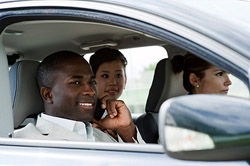Ridesharing and Carsharing

Rideshare programs help connect people to travel together to the same or similar destinations. Carsharing is a form of shared vehicle access to provide members with vehicles for personal use without the costs and commitment of individual car ownership. Ridesharing, also called carpooling, can reduce travel costs, traffic, and parking demand. Some local and regional governments provide incentives to encourage ridesharing, such as access to high occupancy vehicle (HOV) lanes, discounted fees on roads or lanes, or special parking privileges for vehicles with multiple passengers.
Corporate decision makers and public transportation planners can support rideshare programs by encouraging employees and consumers to participate in rideshare systems. Public transit agencies are also branching out into this space and offering ridesharing opportunities in certain markets (for example, the Regional Transportation District's [RTD] FlexRide program in the Denver metro area).
Employee Rideshares
Employee rideshare programs help coworkers carpool. These programs take advantage of the fact that coworkers commute to the same destination and are familiar with and accountable to one another. Rideshares can be coordinated through internal company websites, smartphone apps, social media, or informal meetings. Some employers encourage ridesharing by offering financial incentives, giving parking preference to carpoolers, providing a guaranteed ride home, or arranging and covering a vanpool.
Ridematching Systems
Ridematching systems help commuters coordinate their rides by identifying potential matches based on location and schedule. Ridematching websites can feature rider or driver reviews, fuel savings calculators, and options for finding back-up rides for special circumstances. Some facilitate money transfers so that riders can cover costs. Businesses can provide ridematching services for their own teams, and organizations such as metropolitan planning organizations or councils of governments can offer ridematching platforms that coordinate residents more broadly across a region. Companies like Via, Scoop, and Bridj also provide ridematching services for a fee by matching location and schedule needs in real time.
Ridesharing Resources
The following resources can provide ideas for how to use rideshare programs:
- "Five Free Rides" Incentive Program – The San Francisco Metropolitan Transportation Commission partnered with a ride share company to offer an incentive for five free rides.
- "Commuter Programs: Drive the Bottom" – Panelists from local companies discussed vanpooling as a way for Triangle, North Carolina area employers to widen their recruitment radius, reduce employee turnover, and increase productivity.
Carsharing Programs
Carsharing programs provide individuals and companies with vehicles for limited use. These programs have various structures and are typically either round-trip station-based, one-way station-based, or one-way floating. In round-trip carsharing systems, shared vehicles are located at designated parking spaces, and individuals check out and return the vehicles to the same location. In one-way station-based programs, participants check out a vehicle at one designated carshare location and return it to a different designated carshare location. One-way floating carsharing programs allow individuals to locate a shared vehicle that is parked nearby in a publicly available parking stall, drive to their destination, and find another eligible public stall in which to park. Modern car share programs are often app-based and use technology to locate, check availability, and even unlock and start the vehicle.
This service is popular in metropolitan areas where alternative modes of transportation are prevalent, parking is expensive, and many people need specialty vehicles only occasionally. Carsharing companies pay for insurance and in some cases fuel and parking, which provides members of carsharing programs with some of the benefits of vehicle ownership without all the costs. Siting car share locations in low-income communities or as part of multifamily housing can enable underserved communities and residents access to vehicles that may not otherwise be accessible or practical.
Electrification of carshare vehicles can have compound benefits by eliminating tailpipe emissions and lowering vehicle operating costs. Examples of electric carshare programs in the U.S. include, but are not limited to, Blue LA (Los Angeles, California), Evie (Minneapolis – Saint Paul, Minnesota), and Colorado Carshare (Denver and Boulder, Colorado).